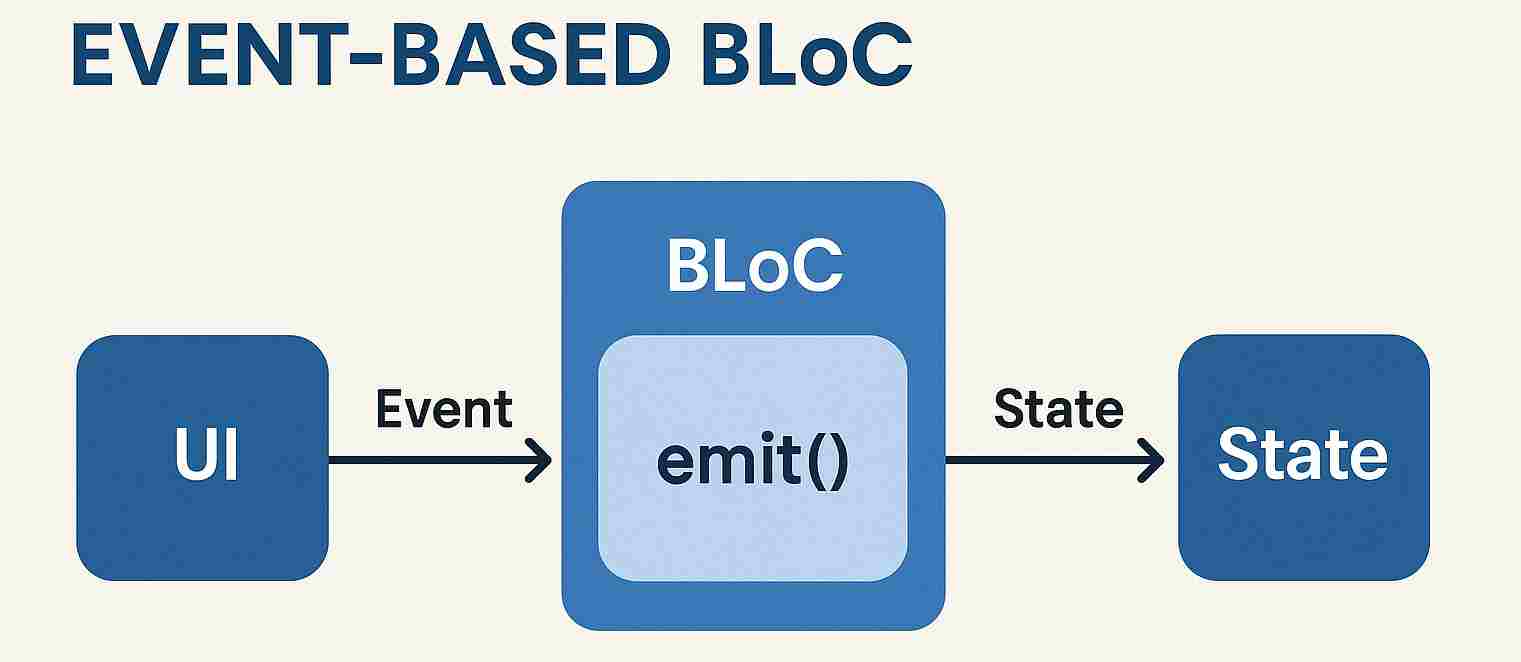🧠 What is Event-Based BLoC?
Unlike Cubit, the BLoC pattern uses events to trigger state changes, making it ideal when:
- ✅ You have multiple event types
- ✅ You want to separate UI actions from business logic
- ✅ You’re dealing with asynchronous or complex workflows
🎯 Let’s Build a Subscriber App with BLoC

lib/
├── bloc/
│ ├── subscriber_bloc.dart
│ ├── subscriber_event.dart
│ └── subscriber_state.dart
└── main.dart
🔹 Step 1: Define Events
📁 lib/bloc/subscriber_event.dart
abstract class SubscriberEvent {}
class Subscribe extends SubscriberEvent {}
class Unsubscribe extends SubscriberEvent {}
🔹 Step 2: Define States
📁 lib/bloc/subscriber_state.dart
class SubscriberState {
final int count;
SubscriberState(this.count);
}
🔹 Step 3: Create the BLoC
📁 lib/bloc/subscriber_bloc.dart
import 'package:flutter_bloc/flutter_bloc.dart';
import 'subscriber_event.dart';
import 'subscriber_state.dart';
class SubscriberBloc extends Bloc<SubscriberEvent, SubscriberState> {
SubscriberBloc() : super(SubscriberState(100)) {
on((event, emit) {
emit(SubscriberState(state.count + 1));
});
on((event, emit) {
emit(SubscriberState(state.count > 0 ? state.count - 1 : 0));
});
}
}
🧩 UI Integration
🔸 Provide the BLoC
📍 In your main widget tree:
BlocProvider(
create: (context) => SubscriberBloc(),
child: SubscriberPage(),
)
🔸 Show the State
📍 Inside the widget build method:
BlocBuilder<SubscriberBloc, SubscriberState>(
builder: (context, state) {
final count = (state as SubscriberValue).count;
return Text('Count: \$count', style: TextStyle(fontSize: 30));
},
)
🔸 Trigger Events
📍 Buttons to interact with BLoC:
FloatingActionButton(
onPressed: () {
context.read().add(bscribe());
},
child: Icon(Icons.add),
),
FloatingActionButton(
onPressed: () {
context.read().add(Unsubscribe());
},
child: Icon(Icons.remove),
),
📍 Main.dart:
import 'package:flutter/material.dart';
import 'package:flutter_bloc/flutter_bloc.dart';
import 'bloc/subscriber_bloc.dart';
import 'bloc/subscriber_event.dart';
import 'bloc/subscriber_state.dart';
void main() {
runApp(SubscriberApp());
}
class SubscriberApp extends StatelessWidget {
@override
Widget build(BuildContext context) {
return MaterialApp(
title: 'YouTube Subscriber Counter',
theme: ThemeData(
primarySwatch: Colors.red,
),
home: BlocProvider(
create: (_) => SubscriberBloc(),
child: SubscriberPage(),
),
);
}
}
class SubscriberPage extends StatelessWidget {
@override
Widget build(BuildContext context) {
return Scaffold(
appBar: AppBar(
title: Text('YouTube Subscriber Counter'),
centerTitle: true,
),
body: BlocConsumer<SubscriberBloc, SubscriberState>(
listener: (context, state) {
if (state.count == 0) {
ScaffoldMessenger.of(context).showSnackBar(
SnackBar(
content: Text('No more subscribers left!'),
backgroundColor: Colors.red,
duration: Duration(seconds: 2),
),
);
} else {
ScaffoldMessenger.of(context).showSnackBar(
SnackBar(
content: Text('Subscribers: ${state.count}'),
duration: Duration(milliseconds: 800),
),
);
}
},
builder: (context, state) {
return Center(
child: Column(
mainAxisAlignment: MainAxisAlignment.center,
children: [
Icon(Icons.subscriptions, size: 100, color: Colors.red),
SizedBox(height: 20),
Text(
'${state.count} Subscribers',
style: TextStyle(fontSize: 32, fontWeight: FontWeight.bold),
),
],
),
);
},
),
floatingActionButton: Padding(
padding: const EdgeInsets.only(right: 20.0),
child: Row(
mainAxisAlignment: MainAxisAlignment.end,
children: [
FloatingActionButton(
heroTag: 'unsubscribe',
onPressed: () {
context.read().add(Unsubscribe());
},
child: Icon(Icons.remove),
tooltip: 'Unsubscribe',
backgroundColor: Colors.redAccent,
),
SizedBox(width: 12),
FloatingActionButton(
heroTag: 'subscribe',
onPressed: () {
context.read().add(Subscribe());
},
child: Icon(Icons.add),
tooltip: 'Subscribe',
backgroundColor: Colors.green,
),
],
),
),
);
}
}
✅ Summary
| Concept | Description |
|---|---|
Event |
What happened (e.g., Increment) |
State |
The current UI/data state |
on<Event>() |
Event handler in your BLoC |
emit() |
Sends new state to the UI |
BlocBuilder |
Rebuilds UI on state change |
context.read().add() |
Triggers events from the UI |
🚀 Coming Up Next:
Part 6 – BlocListener and BlocConsumer
Learn how to listen to BLoC changes (e.g., showing Snackbars or Alerts) and combine listeners + UI builders.




